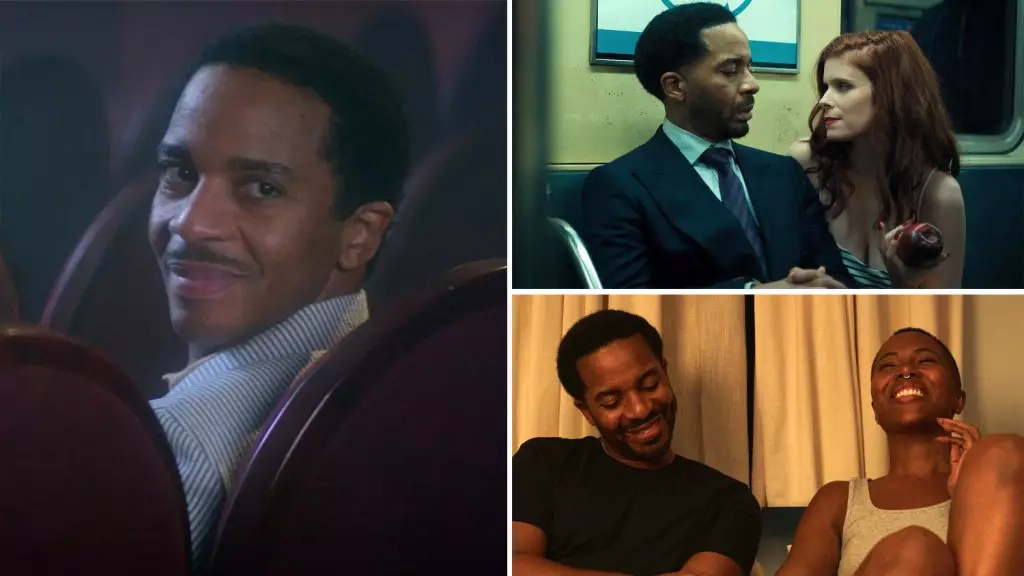The film industry is currently in a vibrant yet contentious landscape, with several new releases shaking up the status quo. Among these, three films stand out—each grappling with themes of faith, identity, and sociopolitical issues. The narratives woven into these films challenge audiences to reflect not just on the stories told but also on the societal undercurrents that shape our collective psyche. As a proponent of center-right liberal principles, I can’t help but see the artistic merit in these works while also feeling the weight of their messages.
André Holland: A Rising Star in Thought-Provoking Cinema
André Holland is making waves in the independent film scene, taking on a diverse array of roles that demand both emotional depth and intellectual engagement. This year, he has cemented his place as a formidable talent with films such as “The Actor,” “Love, Brooklyn,” and “The Dutchman.” Each project seems to peel back layers of identity in ways that resonate with our increasingly fragmented sense of self. In “The Actor,” Holland’s character, Paul Cole, finds himself in a disorienting small town without any recollection of his past. This setup poses critical questions about memory and soul. Can one truly be defined outside their history? It is a philosophical question that feels particularly relevant as we navigate a culture that often seeks to erase or rewrite historical narratives in favor of more palatable versions.
The film generates curiosity around Holland’s performance, where he navigates this duality of self-discovery and uncertainty. The film’s premise resonates deeply in a society frequently grappling with identity politics and the question of authenticity. There’s an undeniable cleverness in how this narrative mirrors our social media age—where curated identities often eclipse the facelessness of reality.
Faith on the Big Screen: Chris Tomlin’s Bold Debut
In the realm of faith-based cinema, consensus often eludes viewers; however, Chris Tomlin’s “The Last Supper” takes on the sacred with grace and artistic ambition. As a Grammy-winning Christian music artist, Tomlin’s entry into filmmaking raises eyebrows, evoking both excitement and skepticism. The intentionally dramatic retelling of a biblical tale—focusing on the moments leading to betrayal—asks viewers to look beyond the surface of spirituality and examine human motivations.
Despite my center-right liberal leanings, I find the embrace of such narratives refreshing. They provide a platform for introspecting faith amidst secular surroundings, something that mainstream culture often sidelines. The film’s promotional material emphasizes its intention to offer unique insights into the divine. Yet, this is where the complexity lies. Can a retelling of an age-old narrative still impart a sense of revelation? Is there a danger in commodifying sacred stories? My gut feeling is that the allure of box office success could overshadow the integrity of the original message if not carefully handled.
The Power of Storytelling: Addressing Urgent Contemporary Issues
The documentary “October 8” stands as a sobering reminder of the current climate of rising antisemitism, particularly in the wake of the recent Hamas attack. Directed by Wendy Sachs and featuring voices from across the sociopolitical spectrum—including activists, journalists, and politicians—this film probes the complex reactions to deep-rooted societal issues that seem more relevant today than ever. It highlights how cinema can serve as both a mirror and a magnifying glass, scrutinizing uncomfortable truths.
Though I stand in a politically moderate zone, witnessing art tackle such a pressing issue leaves me impressed yet uneasy. The documentary’s timing is notable and, arguably, crucial—as it battles to insert reasoned dialogue into polarized conversations surrounding identity and conflict. For those of us who align ourselves with democratic ideals and human rights, the film serves as a call to acknowledge difficult histories without erasing them.
Global Narratives: The Expanding Influence of International Cinema
In an age of globalization, international films like “The 4 Rascals” are challenging the Hollywood monopoly on storytelling. Directed by Vietnam’s Tran Thanh, this romantic dramedy hits universal themes of love and family that transcend cultural boundaries. Its box office success demonstrates a hunger for authentic storytelling, where regional narratives find a home on the world stage.
Here’s where my center-right perspective finds optimism; the success of such films reaffirms the world’s appetite for varied perspectives while also emphasizing the need for authenticity in storytelling. The notion that local narratives can resonate globally is incredibly promising, as it fosters a more inclusive understanding of our shared human experience.
As 2023 unfolds, these films create a complex tapestry revealing the various shades of modern storytelling. In their own ways, they prompt viewers to confront uncomfortable truths while celebrating personal and collective journeys through identity, faith, and community. It’s a testament to the power of cinema, which, in its rawest form, can capture the zeitgeist in ways that dialogue often fails to achieve.

